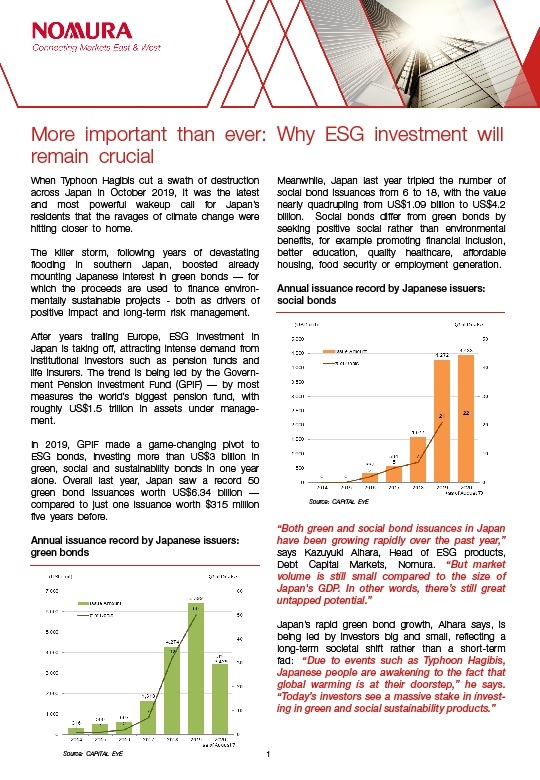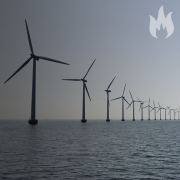Download the PDF to read the full white paper

More important than ever: why ESG investment will remain crucial
- ESG investment in Japan is taking off, attracting intense demand from institutional investors. Financing ESG projects has moved from simple green loans to a highly diversified range of products, in which Nomura has a long history of innovation.
- Though the COVID-19 pandemic is likely to hit demand for green bonds in the short term, the crisis could ultimately galvanise global opinion on the need for investment that promotes social good.
- Through its acquisition of Greentech Capital Advisors, Nomura intends to accelerate its mission of merging innovative tech with smart financing.
After years trailing Europe, ESG investment in Japan is taking off, attracting intense demand from institutional investors such as pension funds and life insurers. The trend is being led by the Government Pension Investment Fund (GPIF) — by most measures the world’s biggest pension fund, with roughly US$1.5 trillion in assets under management.
In 2019, GPIF made a game-changing pivot to ESG bonds, investing more than US$3 billion in green, social and sustainability bonds in one year alone. Overall last year, Japan saw a record 50 green bond issuances worth US$6.34 billion — compared to just one issuance worth $314 million five years before.
Japan’s rapid green bond growth reflects a long-term societal shift rather than a short-term fad. One reason is the increasing frequency of climate-related disasters in Japan, such as Typhoon Hagibis which killed dozens and caused massive destruction in October, 2019.
“Due to events such as Typhoon Hagibis, Japanese people are awakening to the fact that global warming is at their doorstep,” says Kazuyuki Aihara, Head of the Sustainability Finance Section in Nomura’s Debt Capital Markets Department. “Today’s investors see a massive stake in investing in green and social sustainability products.”
Innovation for impact
One of the most powerful ways of fostering impact, as well as return, is investment in green technologies. A critical piece of this innovation picture, however, is also imaginative green financing solutions.
According to APEC, ESG financing has moved from a simple model of banks extending green loans to a highly diversified range of methods and products — including green bonds, private equity, green insurance, and M&A.
Picking the right approach for each situation requires a high level of expertise, to optimise potential for both impact and return. One such example came in 2018, when Nomura served as bookrunner for the world’s first green bond in global shipping, enabling Japan’s NYK Line to partially decarbonise shipping by building LNG-fuelled vessels. Underscoring its expertise in Europe, the centre of the ESG investment market, in July 2020 Nomura acted as a lead arranger of de Volksbank’s €500m green bond – the first ever Tier 2 capital instrument in ESG format from any European bank.
Now Nomura intends to accelerate its mission of merging innovative tech with smart financing through its acquisition of Greentech Capital Advisors, the global leader in green innovation M&A. It promises synergies between Greentech’s green innovation acumen and Nomura’s sophisticated debt structuring approaches: “This will be transformational,” says Jarek Olszowka, Head of Sustainable Finance at at Nomura.
Transition bonds: a novel approach
Despite the proliferation of interest in both ESG technology and financing, it might be too much to expect high-emission industries to change overnight.
Transition bonds are an important innovation in ESG investment that seek to address this. They are designed to help carbon-intensive industries transition towards low carbon business models. The debt is issued by industries that are “brown” today but aspire to transition to green practices, or at least become “less brown.”
Sustainability-linked bonds, meanwhile, are another interesting ESG instrument on the horizon. Rather than ring-fencing bond proceeds to eligible green or social projects, their financial and structural characteristics vary depending on whether the issuer achieves a predefined sustainability or ESG objective. Through these bonds, issuers are committing to future improvements in sustainability outcomes within a set timeline.
While such approaches are controversial, with some arguing they lend a “halo effect” to not-so-green industries, Olszowka says a pragmatic approach may be needed to ensure a healthy world for future generations: “Green bonds aren’t enough to meet the Paris Accord climate goals,” he argues.
COVID-19 and ESG’s future
The coronavirus crisis and its devastating economic and social impact has resulted in a temporary slowdown in the promising discourse surrounding green investments, in particular in the initial stages of the lockdown. The first half of 2020 saw global green bond issuance fall by 8% compared to the first half of 2019, totalling USD119 billion.
However, Nomura sees long-term ESG opportunities springing from the pandemic, for example in promoting solutions to global health challenges and societal disruption. There has already been a surge in social bond issuance, which grew by an astonishing 376% in 1H 2020 from 1H 2019, totalling USD41.9 billion. Nomura has acted as underwriter for a number of pioneering bonds issued in recent months to help mitigate the impacts of COVID-19.
Aihara predicts that the pandemic will ultimately galvanise global opinion on the need for investment that promotes social good: “When this crisis is over,” he says, “investors in the market are likely to have greater consideration for sustainability in society.”
Nomura’s commitment
Nomura is committed to the principle that ESG investment is a powerful vehicle to spark a “virtuous cycle” in society, laying the conditions for long-term sustainable growth.
Through its global reach, Nomura seeks to foster the positive dynamic currently underway in Japan, in which the custodians of society’s financial security — its pension funds — converge on the logic of entrusting their staggeringly large assets to green vehicles.
“By changing the world for the better, investors can get a better performance in the long-term from their funds,” says Aihara. “That is the view of the ‘universal owner.’”
Contributor

Jarek Olszowka
Head of Sustainable Finance, Nomura

Kazuyuki Aihara
Head of ESG Products, Debt Capital Markets, Nomura



